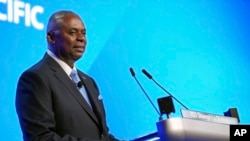Speaking at the recent Shangri-La Dialogue defense summit in Singapore, Defense Secretary Lloyd Austin said, “The United States is deeply committed to the Indo-Pacific. We are all in.”
“As President Biden has said ...‘The United States remains vital to the future of the region – and the region is more vital than ever to the United States of America.’”
Over the past three years, “a new convergence” has developed “around nearly all aspects of security in the Indo-Pacific,” said Defense Secretary Austin. The new convergence is not a single alliance or coalition, but “a set of overlapping and complementary initiatives and institutions, propelled by a shared vision, a shared sense of mutual obligation:”
“Countries across the Indo-Pacific, including the United States, are converging around these enduring beliefs: respect for sovereignty and international law. The free flow of commerce and ideas. Freedom of the seas and skies,” he said. “The peaceful resolution of disputes through dialogue – and not coercion or conflict.”
“The United States can be secure only if Asia is secure,” said Defense Secretary Austin. “And so we are operating together with our allies and partners like never before. And that part of the new convergence means more interoperability, more advanced capabilities and more security.”
Defense Secretary Austin highlighted numerous areas of progress on developing new partnerships and refreshing established ones. He pointed to better integration between the United States and its Indo-Pacific allies’ military operations and defense industries, including the creation of a multi-year trilateral exercise plan with Japan and the Republic of Korea. The U.S. also secured a series of historic agreements with its allies and partners, including Japan and the Philippines, to transform U.S. force posture throughout the region.
Among other efforts, with the Quad the U.S. is helping its partners sharpen their operational picture of their exclusive economic zones. With Tokyo and Seoul, the U.S. is sharing early-warning data on North Korean missiles — in real time. The U.S. is also making major investments in its submarine industrial base to help strengthen its AUKUS partnership with Australia and the United Kingdom.
“The Indo-Pacific’s new convergence points to a better future for all our countries,” said Defense Secretary Austin. “Together, we’re ensuring the Indo-Pacific will remain open and free.”






